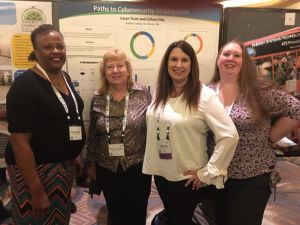
Three years after enrolling in Highline College’s networking associate degree program, Colleen Day is teaching networking as a tenure-track faculty member of Renton Technical College in Renton, Washington.
The mid-career change is still a bit of a surprise to Day who was initially seeking an associate degree. She thought this credential would help her get a networking job with a medium or large business. She had taught herself networking skills while running several small businesses, but other employers were not convinced she had information technology skills.
Amelia Phillips, professor of computer information systems and computer science at Highline College in Des Moines, Washington, noticed Day’s computer skills and teaching talents during her first semester at Highline in 2015. “She was in my Networking Intrusion Detection class and my Linux Administration class, and she was helping the other students. That’s what it was. I could see. She would figure it out, and then she would figure out what the other students needed … students help each other, but not at that level,” Phillips said.
After Day earned CISCO instructor certification, Highline College hired her as an adjunct instructor to teach networking while Phillips was on leave in 2017-2018. During an interview at the 2018 Advanced Technological Education (ATE) Principal Investigators Conference in Washington, D.C., Phillips said the master template that Day created for the network intrusion detection course is so good that she herself uses it now to guide her instruction.
Day said she enjoyed teaching so much at Highline that she applied for other adjunct positions in the region and Renton Technical College hired her for the tenure track position with the understanding that she would pursue both a teaching license and a master’s degree in cybersecurity.
Immediately after high school Day earned a bachelor’s degree in psychology from the University of Puget Sound. She never pursued a psychology career, however. Instead she worked for four years at Boeing, which trained her as a manufacturing engineer. Then for 15 years she ran three businesses: a medical office, and a medical spa and diet center that she partially owned.
“I’ve always just had this knack for technology. And, of course, when you run your own businesses you do your own work, your own networking. So when we dissolved those businesses I started another business with another doctor,” she said. She found that she missed her computer-focused work and began applying for jobs, but potential employers doubted her capability given her lack of technical credentials.
As a student at Highline she was featured in a video that promotes cybersecurity careers to women; as a faculty member at Renton she has helped students start a cybersecurity club.
At the 2018 ATE Principal Investigators Conference she and Caryn Truitt, a cybersecurity bachelor’s degree student at Highline, presented the findings from their fall 2018 survey of 102 cybersecurity students and recent graduates. Day said the main “snapshot” of information from the survey is that a degree is not enough for people to obtain cybersecurity jobs. For entry-level positions employers expect technicians to have a degree, two-to-three years of experience in networking, plus industry certifications.
“You need to be really realistic about what’s going to go into those students being employed with cybersecurity. They [aspiring cybersecurity technicians] have to have certifications—at least one—and they need some experience while they are in school,” Day said.
Phillips is the principal investigator of the International Collegiate Cyber Defense Invitational (ICCDI) Competition, which received National Science Foundation grant support and is affiliated with CyberWatch West’s ATE activities.
As Day and her colleagues build the cybersecurity program at Renton Technical College she hopes to involve students in the competition led by Highline faculty that has previously had students from Namibia, Indonesia, and U.S. community colleges and universities collaborate as well as compete.

 Subscribe
Subscribe


 See More ATE Impacts
See More ATE Impacts

Comments
There are no comments yet for this entry. Please Log In to post one.